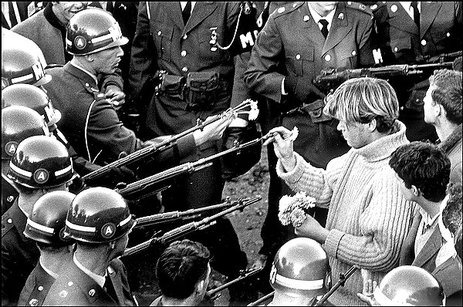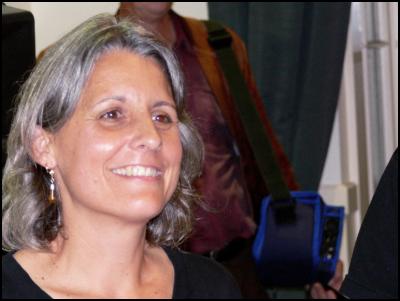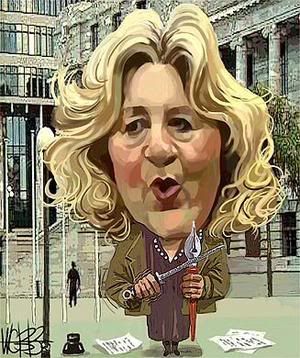John Key's Bodyguard? Jane Clifton's latest Listener column uses this week's One News/Colmar-Brunton poll to paint a picture of an electorate grown weary of big ideas and convinced that, in a world of economic woe, life under the National-led Government is about as good as it gets. Especially since none of the other parties could do any better. As spin goes - it's pretty good.
JANE CLIFTON’S ANALYSIS of the latest One News/Colmar-Brunton poll (The Listener, April 14-20, 2012, pp. 12-13) makes fascinating reading. Like me, The Listener’s political columnist is astonished that the National Government appears to have sustained no damage:
It’s as if the whole of this year, with its unending stream of mini-scandals and unpopular announcements, never happened.
But, rather than question the credibility of the poll, Ms Clifton questions us – the people.
The poll’s lack of responsiveness to such carry-on is a total mystery – unless you consider that people might be beginning to have a different relationship with both politicians and the media. As in, perhaps they are just filtering out the argy-bargy, and the strongest, bossiest prognostications, because they no longer trust any sort of absolutism.
Who would have thought that Jane (Wot, me an intellectual? Geddaway wif ya!) Clifton would end up putting such a smooth, post-modernist spin on her analysis? This is nothing less than Jean Francois Lyotard’s “incredulity towards meta-narratives” translated into Wadestown dinner-party-speak.
Thrown in for good measure is an impressive little riff on the political impact of globalisation:
[V]oters may now be viewing domestic political noise in the light of wider global realities, and this could be making them more sanguine about the brush fires.
Only a few years ago we were gazing longingly at Ireland’s economic prowess, and now we see the Celtic Tiger declawed and practically auctioning its stripes to stay afloat. That has to have an impact on how we view stringencies here.
Ms Clifton’s voter is nothing if not sophisticated. Grown incredulous of “absolutist” meta-narratives, she is reassessing her expectations of politics and politicians in the light of dramatically re-ordered global realities. This paragon of civic responsibility understands that:
Not just now, but for the foreseeable future, our normal economic reckoning has had to change, and perhaps it’s political noises about that stuff that we’re listening for, while screening out the rhetoric and theatre.
John Key is blessed indeed to have such a journalistic bodyguard. Because, if we carefully dig into Ms Clifton’s analysis, what we find is a core proposition of confidence and satisfaction. Apparently, Mr Key’s National Party-led administration is about as good as it gets these days:
Do we really think Labour, the Greens and New Zealand First would be able to govern without making similar or equivalent cuts and trade-offs?
Austerity, lowered expectations, a default cynicism towards anything smacking of “rhetoric and theatre”: this, according to Ms Clifton, is the new black of political discourse. Get used to it.
Democracy itself: the whole notion of an engaged citizenry holding their rulers to account, dissolves before our eyes in Ms Clifton’s clever prose:
It’s possible a lot of people now see politicians’ squabbles rather in the way they view Kim Kardashian’s bottom – as something to contemplate to pass the time in a supermarket checkout queue, but not as any useful pointer to character or competence.
Guy Debord, who gave us “The Society of the Spectacle” would no doubt feel vindicated by Ms Clifton’s description of the vacuity of contemporary political life. Way back in 1967 he observed: “The spectacle presents itself as a vast inaccessible reality that can never be questioned. Its sole message is: ‘What appears is good; what is good appears.’ The passive acceptance it demands is already effectively imposed by its monopoly of appearances, its manner of appearing without allowing any reply.”
And isn’t that the entire purpose behind Ms Clifton’s treatment of the One News/Colmar-Brunton poll? Our unquestioning acceptance of its findings is secured by making us collaborators in our own compliance. In the world Ms Clifton has constructed, Kiwis are no longer interested in big explanations or big solutions; because it’s a jungle out there, economically, and we’re doing better than most; and, anyway, nobody could run things any better; because all political parties are really the same; and that’s why more than half of us are sticking with the devil we know.
But let’s just examine that One News/Colmar-Brunton poll for a moment. As presented on people’s screens it is already a highly misleading document. For a start, where is the information about how many people were contacted by the pollster, and of those how many consented to being questioned? It’s not there. Nor is the number of respondents who said they didn’t know, or were uncertain, about who to vote for. Or, those who declared they wouldn’t vote at all. What we see on our screens are the rounded-up levels of support for each party after the “Undecideds” and “Won’t Votes” are dropped out.
We are told by Colmar-Brunton that their raw data is massaged to ensure it accurately reflects the gender, ethnic and residential contours of the population – presumably based on Census data that is now at least 6 years out-of-date. What we are not told is that Colmar-Brunton makes no allowance for the distribution of household income in New Zealand.
Turnout for the 2011 General Election, at 74.21 percent of registered voters, and 69.6 percent of eligible voters, was one of the lowest on record. Did Colmar-Brunton ever draw our attention to the possibility that between 25-30 percent of New Zealand voters might abstain from voting altogether? Did they draw any conclusions as to the likely impact of such a high abstention rate on the final result? No, they didn’t. And, apparently, TVNZ didn’t ask.
Only in the last line of her column does Ms Clifton draw attention to the fact that the polls are not always accurate predictors of electoral outcomes:
Or, as Jim Bolger said in 1993 when he unexpectedly almost lost the election. ‘Bugger the pollsters’.
And even here, she gives herself away. Because for those of us on the Left of New Zealand politics; those who’d been involved with the Alliance; those who’d watched the growth of New Zealand First; there was nothing unexpected about the closeness of the 1993 result. Indeed we were absolutely gobsmacked that any prime minister, after presiding over swingeing budget-cuts and spiralling unemployment figures, could possibly have given credence to opinion polls telling him he was going to win at a canter.
Far from existing in the best of all possible post-modernist worlds, New Zealand in 2012 is seething with anger and frustration. And by no means all of it is directed at John Key’s government. Many voters are just as fed up with the Labour Party and its seeming incapacity to either understand their aspirations, or articulate their rage. If any group has a 51 percent share at the moment it is surely the group that's crying: “A plague on all your houses!”
Ms Clifton will have none of that, however. And really, how could she? When was she last locked-out of her workplace? When did the bank last foreclose on her home? When was the last time she went hungry so her children could eat?
When the pollsters and the networks start asking those questions, Jane, write us another column. And, when you can answer them yourself, perhaps you’ll understand why so many of us remain sceptical of their “snap-shots”.
Not everybody lives in Wadestown.
This posting is exclusive to the Bowalley Road blogsite.

















